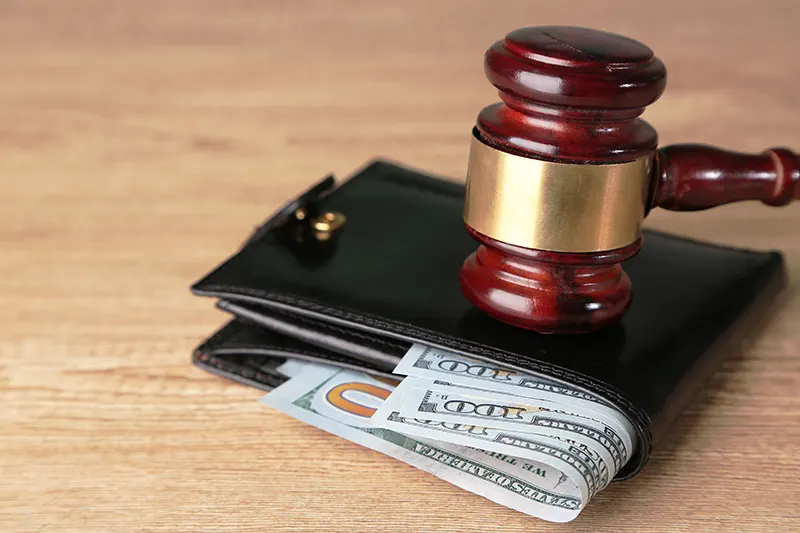Stop Wage Garnishment
The IRS can garnish (or seize) your wages if you owe them back taxes. This can be nerve-racking if it happens to you. The big question is, can the garnishment be stopped? The answer is most likely “yes,” but it really depends on your specific situation. One of our experienced tax professionals can guide you through the process for removing the garnishment.
What is a wage garnishment?
A wage garnishment is a form of levy. The IRS and some state taxing agencies have the authority to garnish (or seize) part or all of your paycheck in order to pay your overdue or back taxes.
Can the IRS garnish your entire paycheck?
They are not likely to garnish your entire paycheck, but they can in certain circumstances. In most cases, the IRS will conclude that all your wages are subject to garnishment, except for the exempt amount.
What is the exempt amount?
Most people are allowed an exempt amount, which is a certain amount of money exempt from garnishment every pay period. This amount is determined in part by a calculation based on your filing status and number of dependents.
Your exempt amount takes into consideration all sources of income. If you have more than one source of income, the IRS could garnish your entire paycheck if the other source covers your exempt amount.
If you receive a bonus check from your employer, it is subject to full garnishment. Since your exempt amount is calculated based on your normal pay periods, bonus checks, commissions, and similar items are all subject to full garnishment until the tax debt is paid in full.
Will your employer be informed of the garnishment?
Before the garnishment starts, the IRS will send your employer a letter informing them of the garnishment. They must comply with the garnishment order within one pay period.
The IRS garnishment order will not give your employer an amount to garnish; rather, they will send Publication 1494, which provides the tables indicating how much take home pay is exempt from garnishment. It is up to your employer to determine the amount of garnishment based on the IRS tables. Your employer will give you a Statement of Dependents and Filing Status to fill out. You must return this form to your employer within three days or your exempt status will be considered married filing separately with zero dependents. Failure to return the Statement of Dependents and Filing Status to your employer in time could result in a lower exempt amount and larger per paycheck garnishment from the IRS.
Your employer is legally obligated to carry out the garnishment order. If they fail to implement the garnishment order they may be required to pay the amount out of their own personal funds. In addition, a penalty of fifty percent of the wages that should have been paid to the IRS may be assessed.
What about independent contractors or people who own their own businesses? Can the IRS still garnish their wages?
Even if you don’t have a direct employer, you are not immune to wage garnishment. The IRS can get hold of your income by placing a garnishment order on your customers. Yes, that means your customers will know you owe the IRS back taxes and instead of paying you for your services, they will be forced to pay the IRS.
Are wage garnishments a matter of public record?
Yes, wage garnishments are a matter of public record, and thus, being under a garnishment order could make it harder for you to qualify for or refinance a mortgage, take out a car loan, establish a new line of credit, or find employment.
How can you stop wage garnishment?
The IRS will take a certain amount of money from your paycheck every pay period until your overdue taxes are paid in full or one of the following conditions is met:
- You make arrangements with the IRS to pay your overdue taxes another way. (This could be through an installment agreement, offer in compromise, or other tax debt relief method.)
- Your statute of limitations on the collection of the tax due has ended. (Generally, from the date the tax is assessed, the IRS has ten years to pursue collection.)
- Your wage garnishment is creating an economic hardship. (You will need to submit a Collection Information Statement to the IRS to request a determination of economic hardship.)
How can TaxAudit help?
Our experienced tax professionals know how to work with the IRS to stop your wage garnishment. We start with a free consultation. Just fill out the form on this page or call us at 855.893.2308. During this consultation, we will answer your initial questions and determine if we can help based on your specific tax situation.
The next step is a comprehensive assessment of your situation. A tax professional will deep dive into your tax and financial situation and develop a plan to help resolve your tax debt and stop your wage garnishment. The plan will be dependent on your specific situation. We may recommend an Installment Agreement, Offer in Comprise, filing for Economic Hardship Status, or a combination of tax relief options. You will also be given a flat fee quote for TaxAudit to help stop your wage garnishment – or, you can use the plan to resolve the issue on your own.
If you elect to go forward with your personalized plan with TaxAudit, our tax professionals will be vigorous advocates for the best possible outcome of your case. Whether your debt is with the IRS or a state taxing agency, imagine the relief you will feel when your tax professional calls to announce that your wage garnishment has been lifted.

